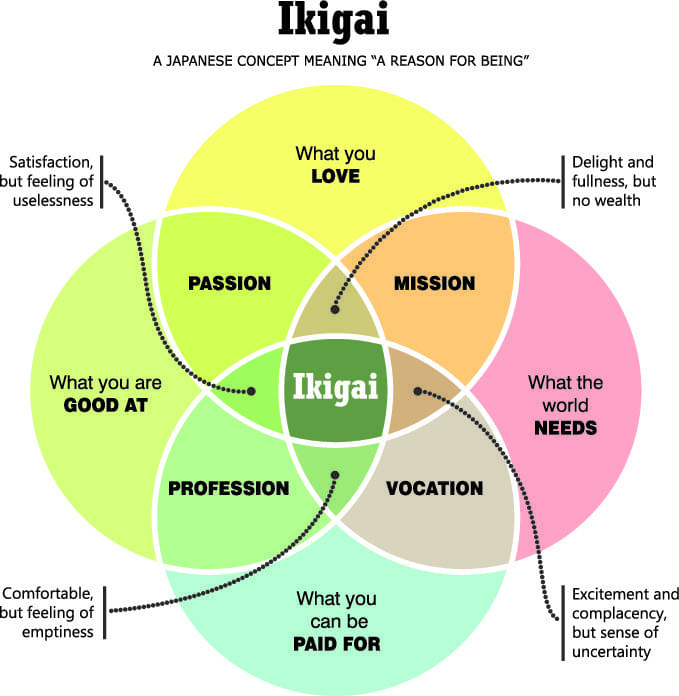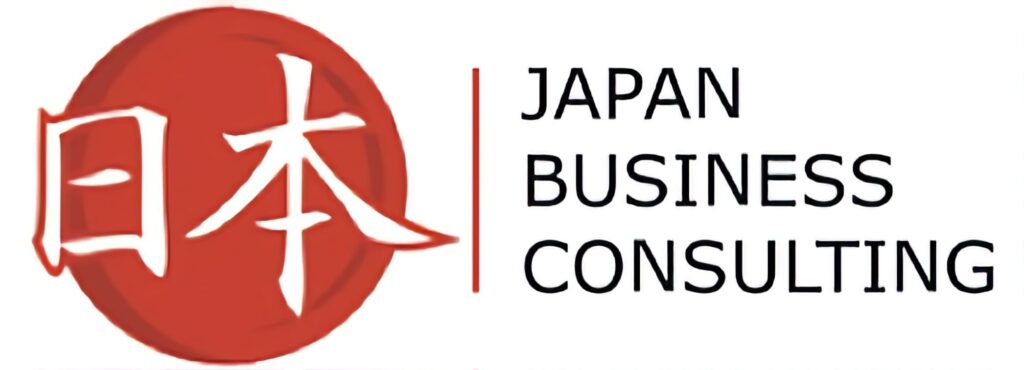How to find your Purpose in Life
Written by Erich Ahorner

Have you heard about the Japanese concept of Ikigai?
The Japanese word Ikigai (生き甲斐) means “reason for being”, and was developed as a form of self-awareness or self-coaching to help you find your personal meaning of life or your true purpose.
As a first step to understanding your purpose, you need to have a feeling of satisfaction and happiness in your daily activities. Therefore, it is important to find out what really gives you a sense of meaning on a daily basis.
To facilitate the process of identifying what makes you truly happy and gives you meaning, the Ikigai model divides activities into four categories:
1. Things you love to do (e.g. Working Out, Photography, Comics)
2. Things the world needs (e.g. Innovation, Human Connection, Conscious Capitalism)
3. Things you can get paid for (e.g. Mechanical Engineering, Corporate Management, Health Care)
4. Things you are good/talented at (e.g. Technology, Nutrition, Languages)
The key is to find an overlap of the four areas mentioned above, and then identify the following intersections that they form with one another:
1.&2. show what your task in life could be (Mission)
2.&3. show what your inner calling might be (Vocation)
3.&4. show what your perfect job could be (Profession)
1.&4. show what you are passionate about (Passion)
Now, let’s put the above into action.
First, write down the following relevant questions (use 4 pages, one for each category), one by one, and then answer them the best you can:
1. What is the first thing that comes to mind when thinking about what you love to do & what the world needs from you (your Mission)?
1.1. Can you imagine doing the task all day?
1.2. Do you enjoy talking about it?
1.3. Did you somehow engage in this task as a child?
2. What is the first thing that comes to mind when thinking about what the world needs from you & what you can make money with (your Vocation)?
2.1. Does it make sense to you?
2.2. Does it harmonize with your values?
2.3. Would the world be missing something if you didn’t do it, and if so, what would it be missing?
2.4. Is this the activity that you want to be remembered by?
3. What is the first thing that comes to mind when thinking about what you can make money with & what you are good at (your Profession)?
3.1. Do you get paid for it?
3.2. Does all your income depend on it?
3.3. Can you make it your job?
4. What is the first thing that comes to mind when thinking about what you love & what you are good at (your Passion)?
4.1. Can you do it better than others?
4.2. Have others said you were good at it?
4.3. Do you have any training in this area?
Now circle the most profound 1-2 answers per category and bring them together on one last page. If you can identify what your Ikigai is at first sight, write it down in the first word that comes to mind.
If it is difficult to define it with one word, no worries. Keep the answers on the last page with you either on your phone, computer or notebook. They will always guide you to your ‘Ikigai’ or purpose whenever you have to make a decision or when you have the feeling you lost track.
You need patience for your ‘Ikigai’.
Your Ikigai is at the point where all four areas intersect. In other words: the answers, which are valid for all categories, point to the perfect life task for you.
Working towards doing that task regularly should help you achieve long-term happiness.
When looking for your meaning in life, patience is important.
Don’t be frustrated if you couldn’t find answers to all the questions above yet. Sometimes, it is necessary to ask yourself the same questions over and over again to come up with insightful answers. So try to make it a habit to revisit the questions 3-4 times per year.
Take a note of anything you can think of in relation to the questions. Sometimes, answers that don’t make sense at first glance can turn out to be very helpful.
Also be aware that you can change and refine your skills (#4 Things you are good at), by reading books, attending seminars, and further education or training, even on the subjects you identified in the other sections.
Perfection is not a prerequisite for taking action, but taking action is the prerequisite for perfection.
Let me close this post with this saying:
“Many people do what they like to do, what they can do, what they are told to do, or what they must do. Very few people do what they are supposed to do.”
I found my Ikigai, which is helping others connect to the Japanese market.
I would love to help you too.
Schedule a call here:

Erich Ahorner
Erich Ahorner helps people enter the Japanese market and grow their businesses. He is an expert at helping people with market entry using online and offline methods and trying to break down necessary steps to make things simple to understand. If you're interested in growing your business or entering a new market to and increase sales then definitely reach out and request a free strategy session today.
Menu
